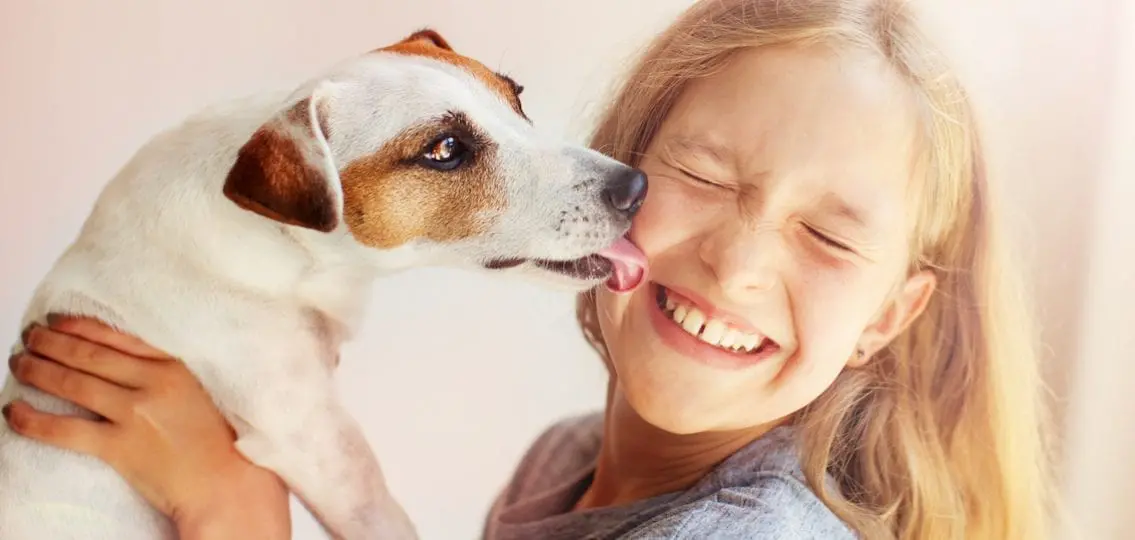Want your child to have a more fulfilling adolescence? Then—Doctor’s orders—get them a furry friend, fast. Here’s why you should get a pet.

Every parent with a tween or teen child has had that moment when your child begs you to get a pet. You may have considered it, but now there are more reasons than ever to make that leap into pet ownership. In my experience, though we have a cat who is attached to me, I am seriously thinking about getting my 10-year-old a dog to give her an “emotional support” of her own. It turns out my timing is right.
“If you are thinking of getting your child a pet, the best time is that tween time, around 11-years old,” says Dr.Sheryl Ziegler, a Denver-based therapist specializing in anxiety and stress and author of Mommy Burnout. “The younger you get the pet before the massive challenges of being a tween, the better.”
Here are some scientific reasons it makes sense to add a pet to your family—joining the 80 million U.S. households who have one—and the emotional, mental and social benefits to making that choice.
5 Reasons to Get a Pet
1. To reduce loneliness
A 2018 study, published in the PNAS Journal, showed that pets reduced adolescent loneliness and social isolation, and helped kids feel they had a friend, especially if they lived in a city.
You only have to look at a kid with their pet to understand why. “It’s a nonjudgmental companion who provides a steady, unconditional love,” says Dr. Ziegler.
“Kids will tell dogs their secrets, talk to them, and dress them up. It gives them easy entrée into a playful, creative, imaginative, social world—and they need that.”
2. For emotional intimacy
“A pet helps tweens and teens build empathy, particularly if the pet is hungry, sick, scared of thunderstorms or fireworks, or injured,” says Zeigler.
Having a cat or dog to come home to, cuddle with, cry on, and play with provides teens with unconditional love and a safe space for emotional intimacy, particularly during the chaotic tween and teen years. In fact, one 2018 study in the Journal of Applied Development Psychology reported that children often feel closer to pets than their own siblings.
“Kids often say, ‘I had to be brave cause the dog was scared and needed me.’ It’s wonderful because kids who walk, feed, and take care of their pets learn to be responsible for something outside of themselves,” she adds.
3. To increase health and wellness
A 2017 study in the Journal of Pediatric Nursing reported that just a 10 minute visit with a pet reduced the stress hormone cortisol in adolescents. Imagine then, how having a pet around all the time will affect your child’s health.
“There are definite physiological changes within our body, when we are around pets,” says Dr. Zeigler. “Blood pressure decreases. Breathing gets slower, muscles relax. When you are in the presence of a pet you feel bonded and attached to, it increases the oxytocin levels-the love hormone in your brain.”
4. For the benefits of physical touch
“When we touch or pet an animal, just as when we hug another person, it’s relaxing,” says Ziegler.
In 2012, Frontiers and Psychology linked petting animals to the release of oxytocin in humans. This release reduces stress and increases feelings of well-being for pet owners.
“When petting animals, you are reducing cortisol levels (the stress hormone that can damage your brain and heart when on overload) while at the time stimulating oxytocin levels (the ‘love’ hormone), that make you feel good,” according to Zeigler. “It’s like the results you get from meditation or deep breathing and doesn’t take a lot of time.”
5. For the long term social and emotional benefits
A 2019 study in the Journal of Applied Developmental Psychology observed that girls had a better response to having a pet and may need the pet even more than boys during their turbulent teen years.
“One reason for these results is possibly because girls have more social pressure on them than boys,” says Ziegler. “What’s clear is that when kids are playing with pets, anything worrying them or causing anxiety or depression naturally subsides.”
And, the benefits of having pets for tweens and teens has a definite impact on their development. In fact, major universities are studying how interactions with pets reduce homesickness. “Some universities even have programs called Pet Your Stress Away where they bring in pets around finals and midterms,” says Dr. Ziegler.

The benefits of pet ownership are clear, powerful, and healing. They are even clinically proven to reduce parental stress, which is why I’m now starting to search for an appropriate four-legged friend for our family. But, perhaps the most important takeaway for parents is knowing that the skills and health benefits of having a pet can last through your child’s lifetime.




